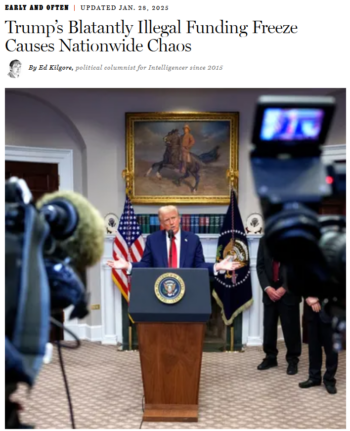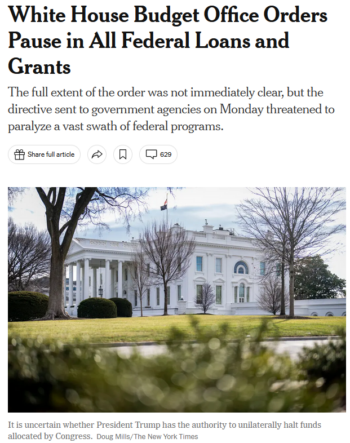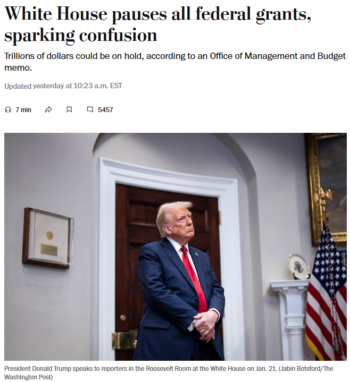
New York‘s headline (1/28/25) was accurate—but was it “riveting storytelling”?
When President Donald Trump ordered an unprecedented freeze on all federal grants and loans, a few news outlets responded with at least some degree of appropriate alarm and scrutiny.
“Trump’s Massive Power Grab,” read the headline for Politico‘s Playbook newsletter (1/28/25). “Trump’s Blatantly Illegal Funding Freeze Causes Nationwide Chaos,” announced the headline over a column by New York magazine’s Ed Kilgore (1/28/25).
The order, both sweeping and confusingly worded, called for a halt to disbursement of federal funds that Congress has already authorized. The memo required all such funding to be reviewed to make sure it aligns with Trump’s “policies and requirements,” including his barrage of executive orders. (After a federal judge temporarily blocked the order, the White House rescinded it.)
The memo specifically highlighted “financial assistance for foreign aid, nongovernmental organizations, DEI, woke gender ideology and the green new deal.” But no funding was excluded from the freeze, aside from Social Security, Medicare and “assistance directly received by individuals.”
As the New York Times (1/27/25) pointed out, this would appear to include “hundreds of billions of dollars in grants to state, local and tribal governments. Disaster relief aid. Education and transportation funding. Loans to small businesses.” Medicaid, which is distributed through the states, also seemed to be frozen.
Politico described “the first big question” as being: “Is this legal?” The answer provided by most legal scholars appeared to be, “hell, no.”
Unfortunately, that wasn’t the information offered by some in corporate media—with the multibillionaire-owned Washington Post among the worst offenders.
‘Democrats contend’

The New York Times (1/27/25) offered its readers agnosticism: “It is uncertain whether President Trump has the authority to unilaterally halt funds allocated by Congress.“
As competent and useful reporting explained, Trump has long declared his interest in impoundment, or the executive’s ability to cancel funding that Congress has approved. It’s something presidents had done on occasion in the past, but Richard Nixon took it to an extreme, attempting to cancel billions in federal spending. Congress responded by passing the Impoundment Control Act in 1974, which requires congressional permission for presidents to impound funds (Forbes, 1/28/25).
In other words, there’s been a clear law on the books for over 50 years that expressly prohibits what Trump was attempting here. It should have been an easy call for journalists, then, to answer Politico‘s basic and central question. Some failed this basic task.
The New York Times report (1/27/25), while raising the question of the move’s legality in paragraph four, didn’t even attempt to answer it, only offering a quote from Senate Minority Leader Chuck Schumer, who argued, “Congress approved these investments and they are not optional; they are the law.“ The article gave readers no other information by which to judge “whether President Trump has the authority to unilaterally halt funds allocated by Congress.”
In its follow-up on the state-led lawsuit to challenge the funding freeze, the Times (1/28/25) briefly described the Impoundment Control Act, but then wrote that “Democrats contend” that Trump can’t unilaterally block funds that have already been approved, as if it were simply a partisan claim whether the law just described exists.
At Axios, co-founder Mike Allen’s brief report (1/28/25) didn’t even address legality, taking the “Why it matters” of Trump’s memo to be that it
will provide the administration with time to review agency programs and determine the best uses of funding for those programs consistent with the law and Trump’s priorities.
‘Generally allowed under the law’

The Washington Post‘s first takeaway (1/28/25): “The feared disruption highlighted the extent of the new Trump administration’s determination to target long-standing functions of the federal government.”
But the Washington Post took craven reporting to another level. In its report on the directive (1/28/25), by reporters Jeff Stein, Jacob Bogage and Emily Davies, the Post‘s headline and lead focused on the “confusion” in Washington. After describing the order and what it appeared to target, the reporters’ first attempt to make meaning of the order came in the eighth paragraph: “The feared disruption highlighted the extent of the new Trump administration’s determination to target long-standing functions of the federal government.”
The president tried to usurp Congress’s power of the purse by fiat, and the Beltway paper’s biggest takeaway was that it “highlights” the Trump administration’s “determination”—not to shred US democracy, but to “target long-standing functions of the federal government.”
But it gets worse. It took another eight paragraphs (that’s the 16th paragraph, if you’re counting) to find the Post‘s first mention of Politico‘s No. 1 question—is this legal? That came in the same Schumer quote the Times used, about how these expenditures “are not optional; they are the law.”
And the Post quickly cast doubt on that idea:
The order’s legality may be contested, but the president is generally allowed under the law to defer spending for a period of time if certain conditions are met, according to budget experts.
The article went on to note that the order “may not have given sufficient grounds under the law to pause the funding,” and that a “left-leaning” expert says that “pausing it over policy disagreements is not legal.” Meanwhile an expert from a “bipartisan” group was offered to argue that Trump “should be legally able to pause the money temporarily,” even if there might be some formal hoops to jump through to extend it.
In other words, the Post‘s framing of the story gave the impression that the memo was “confusing,” but probably mostly legal.
This comes shortly after the announcement of the Post‘s new mission statement, “Riveting Storytelling for All of America,” which owner Jeff Bezos hopes will expand the Post‘s conservative audience (FAIR.org, 1/22/25). As for holding the powerful to account? Well, you might want to look to a media outlet not owned by a toadying oligarch.
ACTION: Please tell the Washington Post not to downplay illegal actions when they are committed by a president its owner is trying to curry favor with.
CONTACT: You can send a message to the Washington Post at letters@washpost.com, or via Bluesky @washingtonpost.com.
Please remember that respectful communication is the most effective. Feel free to leave a copy of your message in the comments thread here.
This content originally appeared on FAIR and was authored by Julie Hollar.
Julie Hollar | Radio Free (2025-01-29T20:49:11+00:00) ACTION ALERT: When Trump Tried to Freeze Federal Funds, WaPo Saw Not Illegality But ‘Determination’. Retrieved from https://www.radiofree.org/2025/01/29/action-alert-when-trump-tried-to-freeze-federal-funds-wapo-saw-not-illegality-but-determination/
Please log in to upload a file.
There are no updates yet.
Click the Upload button above to add an update.